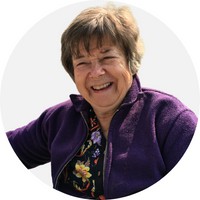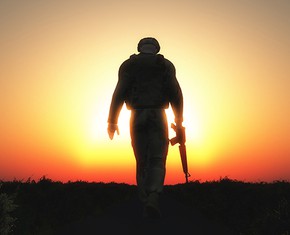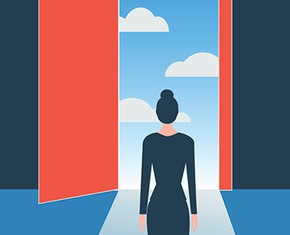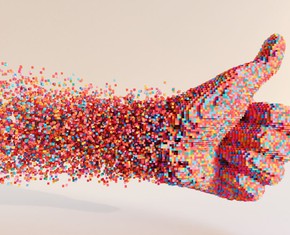The views expressed in our content reflect individual perspectives and do not represent the authoritative views of the Baha'i Faith.
Hi. I’m Frances, and I have profound hearing loss. Hello, I’m Beverley, and I’m in a wheelchair. The two of us, like many others, have disabilities that make it challenging to take part in a spiritual community.
For the disabled, the pandemic has brought new challenges and numerous obstacles, and has had a huge impact on the communication needs of individuals with hearing loss and the access to meetings for those of us in wheelchairs. We want to be included, too – so here are our stories, along with a few suggestions for every person and spiritual community that wants to be welcoming and inclusive.
We’re both Baha’is, and many of us are learning how to make our communities more accessible and inclusive, as we increasingly recognize that the spiritual principle of unity in diversity can release significant energy and facilitate advancement in our communities when everyone is included. This idea of unity in diversity – which includes racial and gender diversity, as well as the entire range of human types and conditions – is one of the core Baha’i principles. This spiritual principle means that every community must do its best to meet the needs of its diverse members, as Abdu’l-Baha explained in a speech he gave in Montreal in 1912:
… other members who for valid reasons are incapacitated – the blind, the old, the deaf – their comfort must be looked after. … no one will remain in need or in want. All will live in the utmost comfort and welfare.
RELATED: How Love Transcends Physical and Mental Disability
Increasingly, we’re recognizing that improving accessibility standards is everyone’s responsibility, and everyone benefits from it.
If you’re wondering how this can happen, the best general principle is to preserve dignity and autonomy for persons with disabilities and health conditions, and for seniors. Communities need to consider many accessibility issues, such as mobility, hearing, visual, mental health, diseases of various kinds, neurodiversity when it comes to the learning processes, material resources like transportation, health care support services, digital literacy support, and language services.
This is Frances, and I’ll share my personal story of the learning process I experienced as an individual with profound hearing loss. To fully participate in any interaction, discussion, or meeting, I rely on lipreading and listening with my cochlear implant. When the pandemic began, I underwent shock, sadness, and stress when I learned that all our Baha’i programs would move online. I wondered how I would be able to communicate with people as a lipreader, since it’s nearly impossible to understand what people are saying online.
Thankfully, a few supportive friends volunteered as typists for our local Baha’i activities, which provided relief. However, manual typing during online meetings is limited, and I could not participate in the numerous online programs. Then I learned about Otter.AI, an artificial intelligence app that transcribes speech to text on cell phones. This communication tool was a lifesaver for me, because I could participate in all community events and explore different online programs with ease, dignity, and independence. Also, in 2021, Zoom began offering free, automatic, and easy to set up closed captions during Zoom meetings. What a relief! I could now understand what everyone was saying in our community’s online meetings.
Then, when I attended two global Baha’i conferences – which posed challenges for me – I consulted and planned with the organizers ahead of time so I could better participate in the conferences, both as a volunteer for the children’s program and as a participant. When I learned that one conference would have 300 people, with masks as a requirement, it stirred anxieties within me as I wondered how I would be able to communicate. I sent an email to the organizers to identify my communication needs and created a plan such as having captions on videos, sitting in the front row, preparing printed materials, and asking people to remove their masks when communicating directly with me. They were most helpful and comforting, which helped to eliminate my anxieties. It was such a gift to mingle with many friends, and I had a special and enriching time.
This is Beverley, and I’ll recount my story. I’m very involved with my community, but as a person in a wheelchair, I have extra challenges to consider since I need to ensure the physical needs for accessibility to the various homes I visit. This usually requires calling ahead with hosts in private homes to arrange what assistance might be needed, such as physically getting into the homes and buildings, and determining ways to remove the barriers for me to attend events.
Like it did for Frances, the pandemic also came as a further test to my personal ability to participate in my community, but despite the technical learning challenges of using Zoom at first, it became my home for connecting with others in diverse spaces. Gradually Zoom became a creative space for reverence and an effective place for holding meetings for various purposes.
I was delighted to discover that one of our newest Baha’i properties in Toronto, which was previously a public facility and therefore subject to provincial building codes, was very accessible to those of us in wheelchairs, even including the washrooms. However, to attend a meeting, I still need to check with the organizers for permission to park in the front or to have someone re-park my car.
Last summer, I had a special experience when I was personally invited before the registration went out, to attend Shining Lamp Baha’i Camp in Ontario. The hosts of this school were also owners of the property on a lake, and they have a wonderful attitude of making their home and facility as universally designed to include and encourage diverse participation. The hosts reached out to me to consult with both my friend Frances and I ahead of time, to determine what I needed and ways to address the issues before attending. As a result, I was able to mingle freely with few barriers with old and new friends and participate fully in the study program. The school’s accommodations helped me to feel comfortable and happy away from my home accommodations, eliminating the anxieties created by the unknowable factors regarding accessibility that so often determine and reshape any experience I engaged in the past.
RELATED: Humanity’s Greatest Gifts
In your own community of friends, you can foster happiness and unity by serving the needs of diverse people, too – by accommodating a person who is deaf or hard of hearing to understand conversations at community functions; by helping a senior who is frail and has low vision to attend community activities; or by assisting a family member who suffers from a crippling and long-lasting degenerative disease. When we take care of each other in these ways, we become even more united.
Our communities have advanced as we learn to apply the knowledge from the experiences and perspectives of persons with disabilities, which can take us a step further in collectively learning about diversity and inclusion in our community relationships. So let’s ask ourselves: what steps can we take to ensure this belief of unity in diversity is actively demonstrated in our communities? Since each person has diverse needs, simply ask directly what specific accommodations they need, and then work on a plan of action to remove any barrier to their participation. This approach develops many skills, because it requires consultation, sensitivity, creativity, and an openness to work out practical solutions. The Baha’i writings recommend this straightforward approach – after all, Baha’u’llah advised everyone to “Take ye counsel together in all matters, inasmuch as consultation is the lamp of guidance which leadeth the way, and is the bestower of understanding.”
A compilation from the Baha’i writings called A Journey of Courage: From Disability to Spiritual Ability is available on Baha’i Publications Australia and Baha’i Library Online. It provides practical information to guide individuals and communities when planning public events, as well as specific guidelines to assist persons who are deaf and hard of hearing and have visual and mobility difficulties.

















Comments
Sign in or create an account
Continue with Googleor